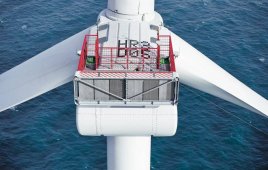In order to secure better financing terms for offshore renewable energy projects, it is crucial to understand and mitigate technical risks in the supply chain, according to the Energy and Water consultancy services division of Intertek, a provider of third party advice.

Offshore wind is a relatively new industry compared to onshore, and marine developments have significantly more risks to consider. FreeDigitalPhotos.net
As offshore wind projects proliferate internationally, developers are finding themselves saddled with higher capital costs unless they have employed appropriate technical due diligence in the procurement stages of the supply chain and can demonstrate the ability to manage risks.
Offshore wind is a relatively new industry compared to onshore, and marine developments have significantly more risks to consider. Therefore, if companies prove they can better manage the risks along the supply chain then finance partners may offer more favorable terms of capital lending. This is currently important in the United Kingdom, as the government there urges developers and utilities to lower the cost of generating offshore wind to £100 per megawatt hours (MWh).
The combination of technical study skills, risk assessments, and due diligence experience, as well as testing and certification services across Intertek, helps reduce risk across the project lifecycle.
“It is important to understand risks for each stage of the project and throughout the supply chain, and then demonstrate to financiers that each issue has been fully considered,” said James Hunt, head of offshore development and cables with Intertek. “This can reduce possible time delays, smooth the process and encourage more favorable terms of capital lending from finance partners, potentially reducing overall cost of funding.
“In cases where we have advised on how technical and schedule risk may impact on investors, and how this can be mitigated or compensated, we have seen prospective lenders consider the issues of risk and contingency. Working with project teams during the initial development of projects helps to avoid many of the pitfalls, particularly before any major contracts are negotiated. We can integrate lessons from other projects into the planning and development of robust mitigation measures, be they contractual, technical or financial,” Hunt said.
Intertek
www.intertek.com
Filed Under: Financing




